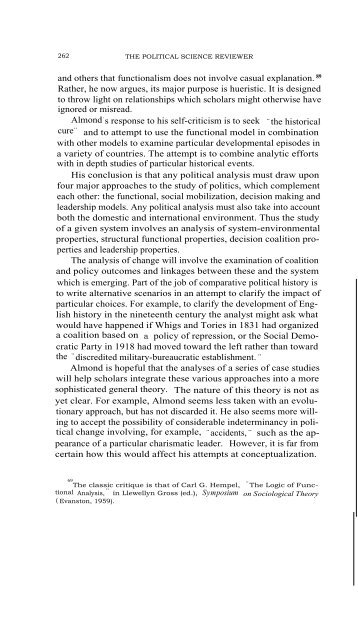FUNCTIONALISM AND ITS CRITICS - Intercollegiate Studies Institute
FUNCTIONALISM AND ITS CRITICS - Intercollegiate Studies Institute
FUNCTIONALISM AND ITS CRITICS - Intercollegiate Studies Institute
Create successful ePaper yourself
Turn your PDF publications into a flip-book with our unique Google optimized e-Paper software.
262 THE POLITICAL SCIENCE REVIEWER<br />
and others that functionalism does not involve casual explanation. 89<br />
Rather, he now argues, its major purpose is hueristic. It is designed<br />
to throw light on relationships which scholars might otherwise have<br />
ignored or misread.<br />
Almond ' s response to his self-criticism is to seek " the historical<br />
cure "<br />
and to attempt to use the functional model in combination<br />
with other models to examine particular developmental episodes in<br />
a variety of countries. The attempt is to combine analytic efforts<br />
with in depth studies of particular historical events.<br />
His conclusion is that any political analysis must draw upon<br />
four major approaches to the study of politics, which complement<br />
each other: the functional, social mobilization, decision making and<br />
leadership models. Any political analysis must also take into account<br />
both the domestic and international environment. Thus the study<br />
of a given system involves an analysis of system-environmental<br />
properties, structural functional properties, decision coalition properties<br />
and leadership properties.<br />
The analysis of change will involve the examination of coalition<br />
and policy outcomes and linkages between these and the system<br />
which is emerging. Part of the job of comparative political history is<br />
to write alternative scenarios in an attempt to clarify the impact of<br />
particular choices. For example, to clarify the development of English<br />
history in the nineteenth century the analyst might ask what<br />
would have happened if Whigs and Tories in 1831 had organized<br />
a coalition based on a policy of repression, or the Social Democratic<br />
Party in 1918 had moved toward the left rather than toward<br />
the " discredited military-bureaucratic establishment. "<br />
Almond is hopeful that the analyses of a series of case studies<br />
will help scholars integrate these various approaches into a more<br />
sophisticated general theory. The nature of this theory is not as<br />
yet clear. For example, Almond seems less taken with an evolutionary<br />
approach, but has not discarded it. He also seems more willing<br />
to accept the possibility of considerable indeterminancy in political<br />
change involving, for example, " accidents, " such as the appearance<br />
of a particular charismatic leader. However, it is far from<br />
certain how this would affect his attempts at conceptualization.<br />
69<br />
The classic critique is that of Carl G. Hempel,<br />
" The Logic of Func-<br />
tional Analysis, " in Llewellyn Gross (ed.), Symposium on Sociological Theory<br />
( Evanston, 1959).
















